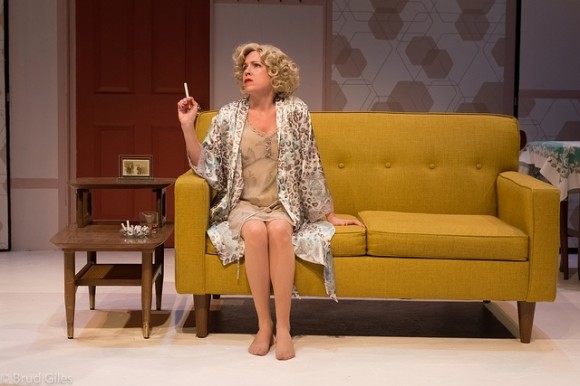Interview Part Three

Megan Kate Ward: How did the the play [Maple and Vine] come about?
Jordan Harrison: In 2009, Adam [my husband] and I had been living in New York for about two years and we were kind of overwhelmed – we felt that every day and every week was just about not sinking under our work load. We only saw each other for an hour at the end of the day when we were catching our breaths and preparing for the next deluge. There was one morning where Adam was about to head to work and we were both doing that thing that Katha and Ryu do in the play where we were staring at our separate laptops looking at our separate news stories, and I noticed he was going and I looked up and said, “Oh hey, what’s your day like?” and he suddenly melted into tears because he was thinking about everything he had to do that day; he was playing the movie in his head of the next 16 hours. That’s the one thing that I lifted straight out of life. And, not coincidentally, it’s one of the harder things I ask an actor to do in the play – just suddenly start crying out of nowhere. It’s weird and hard to explain, but the sort of thing that happens in real life.
And so we started to take more jaunts out of the city, up to Vermont or the Catskills to, I don’t know, pick apples or just sit in a field for an hour and will our lives to slow down. So I exaggerated that impulse from going apple picking to moving to the 1950s. And that is where the play came from on a personal level but there is also a pre-history of the play that’s to do with The Civilians, who are a New York-based theater company who specialize in documentary-style theater. They are a lot more comedic than that title suggestions, but they begin most or maybe all of their projects with their acting company going out into communities like journalists and asking people questions and then the actors write down their memories of those conversations as opposed to tape recording them. In this case the director, Annie Kauffman, came to me with over 100 interviews with different sorts of people who retreat from the modern world. It was called the Modern World Project and there were interviews with civil war re-enactors and cloistered nuns and the Amish and even people’s mothers and fathers who hated their vacuum cleaner – all types of people who were resisting the modern world. And we spent a lot of time trying to figure out where the show was in all this. And the unifying thread I found was people saying that they weren’t scared of how noisy and fast paced the modern world was, they were scared of how quiet it was. Meaning there wasn’t a society of people sitting in moral judgment, looking down on them saying you have to do things this way, you can’t have an abortion, you can’t marry someone of the same gender. They were so overwhelmed by how much choice they had in the modern world that they wanted more limited freedoms. And that seemed to me a very fertile and provocative and slightly uncomfortable idea that someone would choose to have less freedom. And that was a driving question as I wrote Maple and Vine. Why would someone do that and how would they sustain it.
MKW: Why the 1950’s?
JH: I supposed the 50’s have always held some glamour for me, especially the way they are described by Douglas Sirk movies, or the slide shows my grandmother and grandpa would show me when we were kids of them going on cruises to the Italian Riviera, the fur my grandpa bought my grandmother to pretend they were Society, the way they honored 5 o’clock cocktail hour. It was always weirdly fascinating to me as a little gay kid who didn’t know he was gay yet, I suppose. So it’s the 50’s partly because that time period has an idealized distance to it, and partly because it presents the characters with a lot of potential limits on their freedoms. Obviously it was a homophobic time, a racist time, a time with less evolved gender roles and gender politics. It’s got both the glamour and the darkness.
[fblike url=”https://cohoproductions.org/” style=”button_count” showfaces=”false” width=”450″ verb=”like” font=”arial”]

